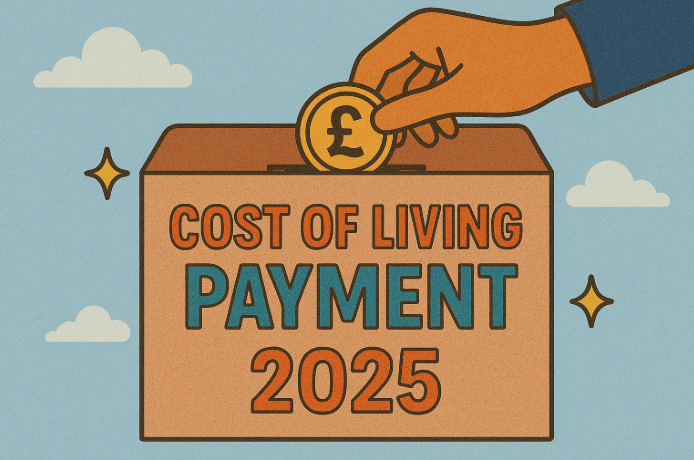The Universal Credit cost of living payment 2025 is a crucial support measure introduced by the UK government to ease financial pressure on low-income households. With inflation and energy prices still impacting everyday expenses, this payment provides much-needed relief. The changes to Universal Credit for 2025 include a significant reduction in the debt deduction cap and an annual increase in the standard allowance. These adjustments aim to offer consistent support to millions of claimants across the UK.
What is the Universal Credit cost of living payment 2025?
The Universal Credit cost of living payment 2025 refers to the support measures built into the 2025 Universal Credit standard allowances rather than a separate one-off payment. Unlike previous years where lump-sum payments were issued to help households navigate sudden inflation and energy price hikes, the government in 2025 has opted to embed the financial assistance directly into monthly Universal Credit payments.
Key Details:
-
No separate lump-sum payments (like those seen in 2022–2024)
-
Instead, support is integrated into regular UC payments
-
Seeks to give claimants long-term stability as opposed to temporary respite.
This approach marks a shift from reactive aid to built-in financial resilience as inflation pressures ease slightly, but affordability challenges remain.
How is the cost of living payment different from regular UC increases?
The yearly increase in Universal Credit is essentially different from cost of living payments. Here’s how they differ:
1. One-Off vs. Structural:
-
Cost of living payments (2022–2024): Temporary lump-sum grants (e.g., £301, £300, £299) issued to eligible claimants.
-
2025 Support: Not a bonus, but part of a permanent increase in Universal Credit standard rates.
2. Trigger Mechanism:
-
Cost of living payments were activated during exceptional economic circumstances, such as energy crises and record inflation.
-
The 2025 adjustments are part of the standard annual DWP uprating aligned with the Consumer Price Index (CPI) from the previous September.
3. Budgeting Impact:
-
One-off payments created temporary relief but didn’t support long-term budgeting
-
Integrated rate increases enhance predictability and reduce income volatility
By choosing to raise standard rates, the government is signaling a return to structured welfare delivery rather than ad-hoc crisis interventions.
How does it fit into the broader Universal Credit system?
Universal Credit (UC) combines six benefits into a single monthly payment, streamlining access to support for millions across the UK. The 2025 cost of living support has been carefully aligned with this model.
Integration Benefits:
-
Simplifies administration by avoiding the need for separate eligibility checks for extra payments
-
Reduces payment delays and errors linked to complex entitlement rules
-
Supports the government’s goal to create a responsive and modern welfare system
Strategic Fit:
-
Aligns with UC’s goal of making work pay—as increased standard allowances help ensure benefits track more closely with real-world living costs
-
Reinforces transparency, as support is visible in every monthly award notice rather than through unpredictable bonus schemes
In essence, 2025 marks a transition year—moving from temporary crisis relief to long-term system improvements.
Who is eligible for the cost of living payment in 2025?
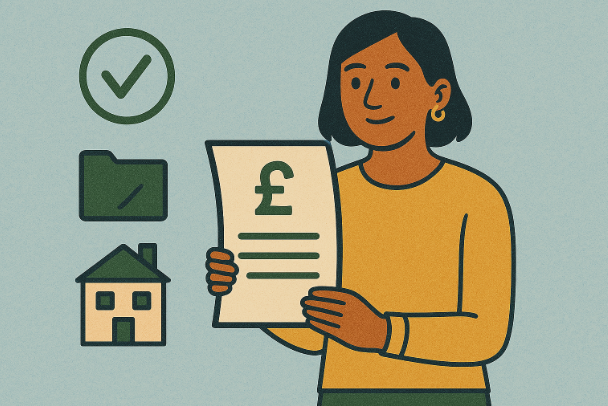
In 2025, the UK government is no longer issuing separate cost of living lump-sum payments. Instead, support is built into the Universal Credit standard allowance through an April 2025 uprating. As a result, eligibility is linked directly to standard Universal Credit rules, not a special application process.
Eligibility criteria and qualifying periods
To receive the increased 2025 Universal Credit payment, claimants must meet the following requirements:
✅ 1. Receive Universal Credit During the Qualifying Period
-
You must have a live and eligible claim for Universal Credit during a designated assessment period, likely around early to mid-April 2025.
-
This is the point at which the uplifted rate is applied and reflected in the May 2025 payment.
✅ 2. Meet Earnings and Circumstantial Thresholds
-
Zero earnings households are typically eligible, but working households can still qualify as long as their income remains within Universal Credit entitlement levels.
-
Your award is calculated based on your earnings, housing situation, family makeup, and disability status.
✅ 3. Reside in the UK
-
The claimants must reside in the Isle of Man, the Channel Islands, or the United Kingdom.
-
Temporary absences abroad (e.g., for travel or family emergencies) could affect payment if they fall during the assessment period.
✅ 4. Up-to-Date Bank and Personal Details
-
To prevent delays, the Department for Work and Pensions (DWP) must have up-to-date information on your bank account and contact data.
⚠️ Note: There is no need to apply separately for the cost of living increase. If you’re eligible for Universal Credit and meet the conditions above, the adjusted rate will be applied automatically.
Impact of sanctions, paused claims, or overpayments
While the 2025 cost of living support is built into standard payments, certain disruptions can prevent you from receiving the full uplift.
🚫 Sanctions:
-
If you’re sanctioned for not meeting work-related requirements (e.g., failing to attend appointments, not actively job-hunting), your UC award may be reduced to £0.
-
In these cases, you may miss out on the uplifted payment for that month.
⏸ Paused or Suspended Claims:
-
Claims that are paused due to missing information or suspected fraud must be reactivated before the assessment date to qualify for increased support.
-
If your claim is closed, you will need to submit a new claim and wait through the standard assessment process.
💷 Overpayments and Deductions:
-
If your entire UC payment is used to recover debts (such as overpayments, rent arrears, or benefit advances), and the resulting award is £0, the system may consider you ineligible during that month.
To ensure you remain eligible:
-
Report changes promptly (e.g., work hours, address, childcare costs)
-
Attend all Jobcentre appointments
-
Regularly check your UC diary for any changes or necessary steps.
Household types: single adults, couples, families
The new monthly rates for 2025 are:
| Household Type | New Monthly Rate (2025) |
|---|---|
| Single under 25 | £316.98 |
| Single 25 or over | £400.14 |
| Couple both under 25 | £497.55 |
| Couple one over 25 | £628.10 |
How much will Universal Credit increase in 2025?
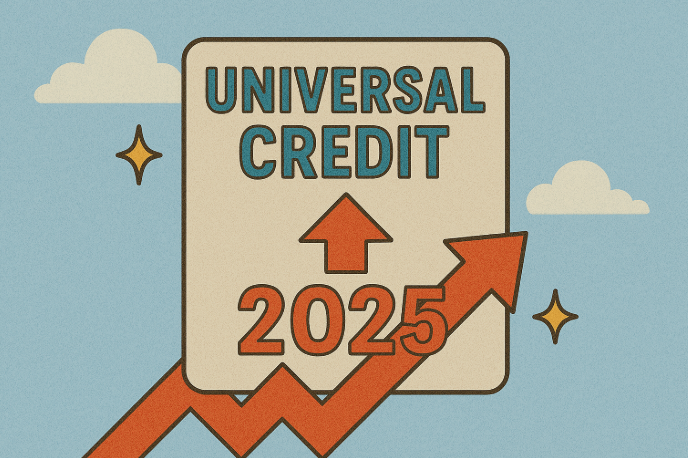
From April 2025, Universal Credit (UC) rates will rise as part of the government’s standard annual uprating process, based on Consumer Price Index (CPI) inflation figures from September 2024. This increase replaces separate cost of living payments, integrating support directly into standard monthly entitlements.
The typical uplift varies by age and household composition but ranges between £20–£40 per month for most claimants. In addition, a key change to debt repayment policy provides extra monthly income for thousands of households.
Financial gain from debt deduction cap
From April 2025, the maximum deduction that can be taken from a claimant’s standard allowance (for repaying debts such as rent arrears or budgeting advances) drops from 25% to 15%.
What does this mean in real terms?
-
Households repaying debt will retain more of their monthly allowance
-
Average gain: Between £30 and £50 per month
-
Annual benefit: Over £400, offering much-needed relief amid rising victuals and housing costs
This change is especially beneficial to vulnerable families repaying historical debts. It allows them to embark on a more stable financial path, where day-to-day essentials no longer clash with repayment obligations.
When will the 2025 cost of living payment be made?
Is there a payment in May 2025?
No. As part of a reimagined approach to cost of living support, there are no separate lump-sum payments scheduled for May 2025. Instead, the uplifted rates are part of the April 2025 changes and apply across regular UC payments from that point forward.
Rather than relying on sporadic aid, the government now weaves long-term support directly into the benefit structure.
Is there a payment in June 2025?
Once more, there won’t be a one-time cost of living payment in June. However, claimants will continue to receive the enhanced monthly rate, which already includes the cost of living increase. Payments follow the standard Universal Credit payment cycle—tailored to each individual’s unique assessment date.
This shift to predictable monthly enhancements reflects a transition from emergency response to foundational reform, helping claimants plan their expenditures with greater confidence.
Monthly uprating timeline and retroactive claims
The Universal Credit uprating occurs annually in early April, but exact payment timing depends on your individual assessment cycle.
Key Points:
-
If your assessment period starts before the new rates apply (e.g., 28 March–3 April), you may not receive the uplifted amount until your next monthly cycle
-
Payments are not backdated unless:
-
There was an administrative error
-
A claimant’s updated status (e.g., additional child, disability element) was delayed through no fault of their own
-
How to Ensure You Receive the Correct Rate:
-
Verify your assessment period dates via your UC journal
-
Report all changes promptly (household changes, income, housing status)
-
If you believe your payment is incorrect, raise a query through your UC online account or Jobcentre contact
Do people on Universal Credit get extra payment cost of living?
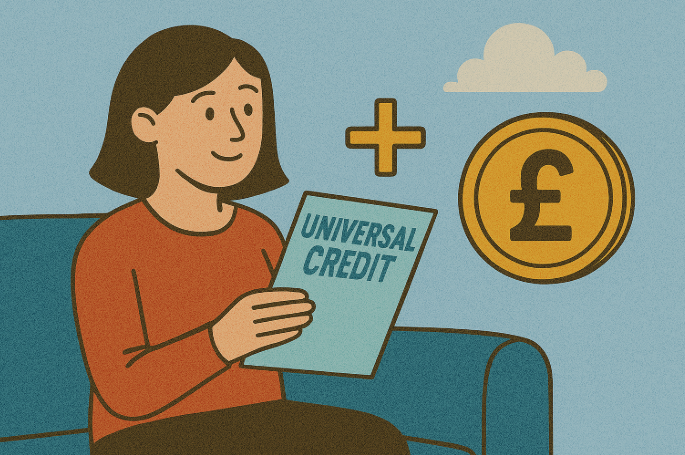
Difference between “Uplift” and “Extra Payment”
In 2025, the term “extra payment” is often misunderstood. Unlike previous years (2022–2024) where defined lump-sum payments were issued (e.g., £301, £299), no additional one-off payment is scheduled for 2025.
Instead, the increase in monthly Universal Credit standard allowances is referred to as an uplift—a built-in increase designed for consistency and predictability.
-
2022–2024: One-off payments announced as part of emergency cost-of-living packages
-
2025 onward: Financial support is embedded in the monthly payment structure
This approach aligns with the DWP’s goal of making support more structural than situational.
One-Off vs. Continuous Support Explained
| Type of Support | 2022–2024 Model | 2025 Model |
|---|---|---|
| Format | One-off lump sums | Monthly increase in base rates |
| Examples | £326, £300, £299 | ~£20–£50 monthly boost (depending on type) |
| Duration | Temporary | Ongoing (baked into UC structure) |
| Application Needed? | No | No |
| Predictability | Low (announced as needed) | High (applied automatically) |
How do recent benefit reforms affect your UC payments?
Debt deduction cap reform – April 2025
Starting April 2025, the maximum amount deducted from UC payments for debts (e.g., budgeting advances, rent arrears) reduces from 25% to 15% of the standard allowance.
Impact:
-
More monthly income left in claimants’ hands
-
Those repaying loans can see an extra £30–£50/month, or over £400 per year
-
Applies automatically—no action needed from claimants
This reform particularly helps families facing historic rent debt or advance repayment, offering greater financial breathing room.
Freeze of UC health element from 2026
From April 2026, the Limited Capability for Work and Work-Related Activity (LCWRA) element will be frozen for new claimants.
-
Existing claimants will continue receiving the current rate (~£390+/month)
-
New claimants post-April 2026 may receive reduced or restructured support
Why It Matters:
-
Creates a potential benefit gap between old and new claimants
-
May affect claimants who have impairments or chronic illnesses.
The administration is being urged by advocacy organizations to reevaluate this freeze since it disproportionately affects those who are most disadvantaged.
What time does Universal Credit get paid into bank accounts?

Is Universal Credit paid by 8pm?
Typically, yes. Most UC payments are cleared into bank accounts by 8pm on the scheduled payment date. However, bank processing times vary, especially with smaller or online-only banks.
What time do payments typically arrive?
-
Most common window: Between 1am and 7am
-
Fastest-paying banks: Monzo, Starling, Nationwide
-
Traditional banks: May release funds later in the morning (e.g., HSBC, Barclays)
If you are unsure, it is advised that you consult your bank’s incoming payment policy.
UC payment dates on weekends and bank holidays
When the due date for Universal Credit is:
-
Saturday/Sunday
-
Bank Holiday (e.g., Easter, Christmas)
…your payment is typically made on the last working day before.
Can I get my monthly Universal Credit Payment early?
In general, no, but exceptions apply.
You may be able to request an early payment (or advance) if:
-
You’re starting a new job
-
You’re facing emergency costs
- You have to travel for medical or professional reasons.
What is the impact on families and children?
Child element updates & family support
The Universal Credit child components will rise in April 2025 in accordance with CPI inflation.
Current Estimates (Post-April 2025):
-
First child (pre-April 2017): ~£333.33/month
-
Subsequent children: ~£287/month
-
Disabled child additions: Up to £487.58/month
Families may also qualify for childcare cost reimbursement, covering up to:
-
85% of registered childcare costs
-
£1,014/month for one child
-
£1,739/month for two or more children
Free school meals for all UC children (from September 2026)
A landmark policy announced for rollout from Autumn 2026:
-
Free school lunches will be provided to all children in UC-claiming homes, regardless of economic level.
-
Intended to improve educational results and decrease child malnutrition
Council-level top-ups and grants
Local councils may offer supplemental support through crisis schemes, including:
| Council | Support Type |
|---|---|
| Camden | Crisis vouchers for food or clothing |
| Manchester | Emergency fuel grants |
| Birmingham | Food parcels and hardship support |
Check your local authority website for:
-
Application forms
-
Eligibility rules
-
Active funding windows
Can I get help with budgeting and debt repayments?
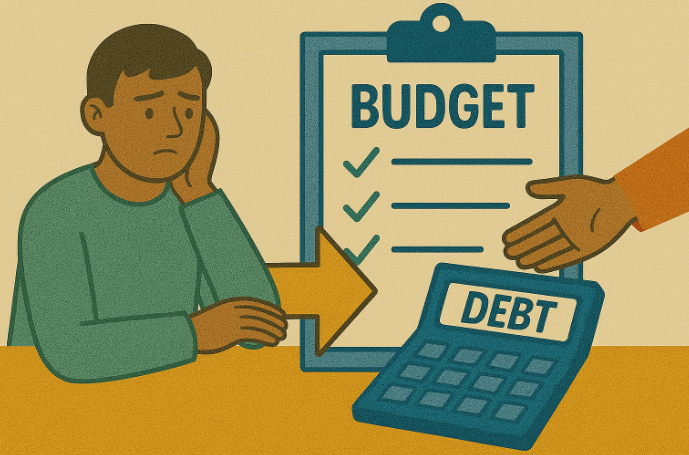
How to apply for a budgeting advance
You may qualify if:
-
You’ve been on UC for 6+ months (or meet exception criteria)
-
You’re below your maximum loan threshold
-
You apply via your UC online journal or Jobcentre appointment
Repayments are automatically deducted in manageable monthly amounts.
Financial relief due to lower deductions
With the 2025 deduction cap lowered to 15%, claimants can:
-
Manage monthly expenses more easily
-
Decrease dependence on emergency credit or food banks
-
Avoid falling further into rent arrears
Top budgeting tools and calculators
- Turn2us Benefits Calculator
- Entitledto Benefits Calculator
- MoneyHelper Budget Planner
How will future reforms affect my Universal Credit beyond 2025?
Health Element and Benefit Freeze
The freeze of LCWRA for new claims from April 2026 may:
-
Create unequal treatment between existing and future claimants
-
Spark legal or political challenges from welfare advocates
Annual increases and CPI + 5% plan to 2029
The government has signalled potential annual uprating of UC by:
-
CPI inflation + 5%, depending on fiscal conditions
-
This would maintain real-term support during uncertain economic recovery
How to stay updated and proactive
Follow:
- GOV.UK benefits news
- Local council bulletins
- Verified social media pages for DWP updates
Conclusion
In 2025, the Universal Credit cost of living payment comes in the form of increased monthly support, not lump sums. With changes like the reduced deduction cap and expanded family support, most claimants will see financial benefits. Staying informed and using local resources can help maximize what you receive.
FAQ
How do I confirm I received the 2025 uplift?
Check your Universal Credit statement for increased standard allowance from April.
Can I still get a budgeting advance in 2025?
Yes, you can apply if you’re eligible and have repaid previous advances.
Will debt deductions reduce automatically in April 2025?
Yes, DWP will apply the new 15% cap automatically.
What should I do if my payment is late or missing?
Contact Universal Credit helpline or check with your bank.
Are cost of living payments taxable or counted as income?
No, they are non-taxable and do not affect other benefit entitlements.
I’m Laura Wilson, a passionate blogger and content creator with a deep interest in business, finance, and entrepreneurship. I’ve had the opportunity to write for several premium blogs, sharing insights & practical advice for individuals & small businesses. I’m the founder and publisher of ukbusinessmag.co.uk, where I focus on creating valuable, easy-to-understand content to help UK startups & SMEs grow.

